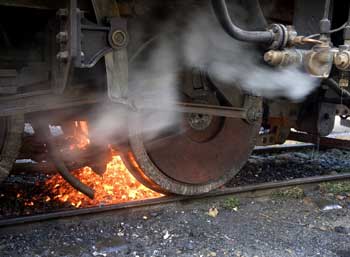fossil fuels as slaves

Preindustrial societies relied on muscle power for work: if not your own, then that of some animal, or of another human. Combustion of fossil fuels has largely become the ‘muscle’ that does most physical work: electricity powering machines that replace the jobs, for example, carried out by slaves in the ancient (and not so ancient) world… petrol pulling our carriages and ploughs. As recently as the American Civil War, people killed to keep their slaves. Many of us – most of us in the ‘developed world’ – entirely rely on this new slavery. It does not seem likely to me that we will give it up without a fight.
[…] fuels function as a ‘labour multiplier’ – they have supplied the ‘slave labour’ that has allowed our present civilisation to surge forward; they are what primarily separates the […]
ricardo I get what you’re saying and will likely spend loose bits of time throughout the day considering the implications both real and fictional.
Are you giving us a glimpse of your next ‘thing’ here?
er… I don’t immediately think so… but since the topics on this blog tend to rise from my subconscious, perhaps… :O)
Tend to agree with Rem that slavery has not died out in industrial societies, and indeed I would go further – we still hear of immigrant labourers in the UK being tied to certain jobs, particularly agricultural, because they’re given incredibly low pay rates with the excuse that the fees for their board and lodgings (on-site) have been deducted. They’re often made to work long hours in bad conditions, and money can be deducted for petty things like too many toilet breaks. Since the (intentional, on employers’ parts) end result is that they can’t get enough cash in hand to go somewhere else and get new lodgings and work, they’re tied to the job they have. Depriving vulnerable people of agency on that scale seems more than analagous to slavery…
I wasn’t suggesting that something like slavery doesn’t occur with people today – far from it…
Enforced labour – If you look at the benefits system in the UK, it does drive people to accept any job, no matter their background or skills.
And worldwide (including UK and Holland) look at how bosses (are allowed to) treat their employees, then one can make an argument that a dilluted form of slavery still exist (village where I come from, staff was still expect to tug forelock when company director came by when I was young).
I’ve heard that the Greeks were well in place to invent steam power – they did, actually, but as a toy- but didn’t need to develop it because they did have a great supply of slaves… ?
My point was really about ‘manpower’ (and ‘horsepower’)… that when the Old Kingdom Egyptians wanted to build the Great Pyramid, they probably had to organize all the available labour of their country and dedicate it for 20 years to the construction. Arguably, if they had had tractors and cranes – all driven by fossil fuels – they could have built several more pyramids in the same time… This is of course one of the reasons why our civilization has been capable of building on so much more massive a scale than the ancient world. Fossil fuels are like the djinni of the lamp, that once summoned, can build a palace overnight.
You’re right about the Greeks. In Alexandria, there were functioning steam engines. If I remember rightly, there were some massive temple doors that would open ‘automatically’ when a coin was dropped into a slot. If you take this along with the Antikythera device – a small hand cranked computer that could calculate the positions of stars and planets for any given time in the past or future – it is clear that the Ancients could have had the industrial revolution… if they had wanted it… But, as you say, their society worked perfectly well without it… In many ways, one of the things that our technology has achieved is to give so many of us the sort of standard of living that only the rich in the past could afford… but, as we now fear, at the cost of global warming…